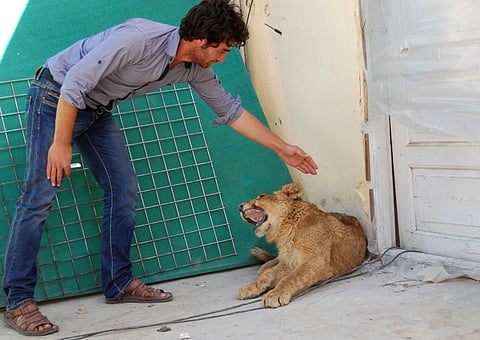The $20,000 pet lion that lives on a Kabul rooftop
Businessman takes the flamboyant lifestyle of the Kabul's elite a step further. He has a lion on his rooftop

KABUL: For Kabul’s wealthy elite some things are de rigueur: armed guards, a marble-clad mansion, a blacked-out SUV. But one man has taken the flamboyant lifestyle a step further and bought a lion.
Mohammad Shafiq, a 42-year-old businessman, is very proud of his growling pet, which spends its days prowling a roof terrace at his sprawling home in a posh residential area of central Kabul.
“A friend said he had a lion in Kandahar and wanted to sell it to me,” Shafiq, who runs a construction company, told AFP. “He knew I loved dogs and birds, but this was more than what I was expecting.
“I had seen lions on television and in the zoo, but never this close. So without any hesitation, I said I will buy it. To me, lions are brave and I respect them. Knowing I could buy one was very exciting.”
The lion, still unnamed, is not chained up and has no collar and spends much of the day lying quietly in a corner of the roof terrace above a storeroom, coming down each evening to eat.
Shafiq says he spends about $1,000 a month employing a caretaker to feed it fresh meat bought from a butcher and also paying a vet to check its health regularly.
Tens of billions of dollars have flowed into Afghanistan in the 12 years since the US-led invasion that toppled the Taliban. Some Afghans have become very rich as a result and they are not shy when it comes to flaunting their wealth.
Kabul is dotted with the flashy houses of the nouveau riche, dripping with chandeliers and nicknamed “poppy palaces” - hinting at the shady provenance of at least some of the money in the world’s leading opium producing nation.
But so far Shafiq is thought to be the only person to acquire such an unusual status symbol.
Shafiq, who says he was a resistance fighter when the Taliban fell and made his money through lucrative construction contracts for clients including the US embassy, said he had owned the male cub for two months and thought it was now about six months old.
“It cost me $20,000, including transport from Kandahar to Kabul by road,” he said, declining to explain about how the lion was driven on the 300-mile (480-kilometre) route that is often hit by insurgent bombs and ambushes.
He brushed off suggestions he is being cruel by keeping a large wild animal in captivity in a city wrecked by decades of war, and said he though it may have come to Afghanistan via Iran.
But during a visit to the house by an AFP reporter and photographer, the lion appeared nervous and growled aggressively when anyone approached it. Shafiq has plans to move it to a large pen in the backyard of another property in the Afghan capital.
Claire McMaster, wildlife director at the World Society for the Protection of Animals, criticised Shafiq, warning that any captive lion posed a serious threat to human life.
“Wild animals should not be kept as pets as it is cruel to hold them in captivity and confined away from their natural habitat, especially as owners are unlikely to meet their complex needs,” she told AFP.
“The other problem with keeping a wild animal as a pet is that unlike domesticated animals, the size and unpredictable behaviour could lead to serious injury or death to the owner.”
Kabul Zoo has a lioness donated by China, and was once home to a half-blind lion called Marjan, who became a symbol of Afghan survival after living through coups, invasions, civil war and the hardline Taliban era.
Marjan, born in 1976, was blinded by a grenade thrown by a vengeful soldier whose brother had been killed after entering its cage, but lived on through until 2002
“I would be shocked if there is a pet lion in Kabul,” Aziz Gul Saqeb, director of Kabul Zoo, told AFP. “It’s very hard to keep a lion, it’s a wild animal.”
For now Shafiq says he is very happy with his pet, but admits he may not be able to keep it in the long-term.
“I don’t know, I will see and I might give him to Kabul Zoo one day,” he said.
Sign up for the Daily Briefing
Get the latest news and updates straight to your inbox



